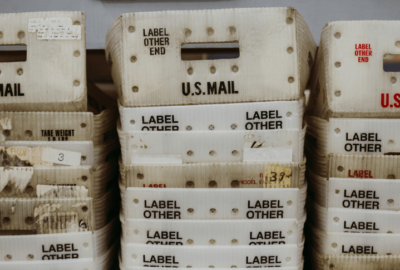

The Postal Regulatory Commission has set out a path for the Postal Service to set higher rates for its market-dominant products, like first-class postage stamps...
The Postal Regulatory Commission has set out a path for the Postal Service to set higher rates for its market-dominant products, like first-class postage stamps.
The PRC, in a new proposed rule, would keep a price cap on USPS market-dominant products, but would base that cap on factors like declining mail density, and mandatory payments to fund health benefits for future postal retirees.
Modifying the rate cap, the commission wrote, would “allow the Postal Service to achieve long-term financial stability and increase operational efficiency while maintaining high-quality service standards.”
The proposed rule filed Thursday stems from a provision in the 2006 Postal Accountability and Enhancement Act, the last major postal bill Congress approved, that requires the PRC to review whether the Postal Service’s rate-setting model meets nine statutory objectives and 14 statutory factors.
During that review, the PRC found that the current USPS rate-setting system “did not meet the objectives relating to the financial health” of the Postal Service.
Part of the problem, the commission wrote, is the Postal Service’s mandate to pre-fund health benefits for future retirees. Prior to the law, the Postal Service paid its share of retiree health benefits on a pay-as-you-go basis.
From fiscal 2007 to 2016, the USPS has been on the hook for an average $5.6 billion each year in payments to the retiree health fund, but the Postal Service has defaulted on many payments to the fund in recent years.
In 2019 alone, USPS missed $7.3 billion in payments to that retiree health fund.
During her five-year tenure, Postmaster General Megan Brennan has pressed Congress to pass a postal reform bill that would eliminate a 2006 mandate for the agency to pre-fund retiree health benefits. Most of the bills introduced in the House and the Senate would solve this by requiring future retirees to enroll in Medicare Part B.
This proposed rule reflects public feedback the PRC received on a previous proposal from December 2017.
Under the earlier version of this proposed rule, the Postal Service would be allowed to raise the price of each class of mail by 2% each year for the next five years. Following that five-year period, the commission will re-review the state of USPS’ financial outlook.
The earlier proposed rule would have also allowed USPS to increase rates by 1% for each class of mail, provided that USPS met its yearly benchmarks for operational efficiency and delivery service.
During the PRC’s 10-year review, the Postal Service has maintained that price caps are unnecessary in a rapidly evolving postal marketplace where USPS customers have alternatives to using the mail.
However, the Postal Service saw a minor setback in September when appeals court judges struck down the highest-ever postage price increase that went into effect earlier this year.
The D.C. District Court of Appeals struck down a five-cent rate increase on the price of a first-class postage stamp, which raised the price from 50 to 55 cents in January.
In an opinion written by Judge Neomi Rao, the Trump administration’s former head of the Office of Information and Regulatory Affairs, a three-judge panel ruled that the Postal Regulatory Commission, which approved the rate increase last year, “failed to provide an adequate explanation of the increase” and “failed to respond to public comments challenging the increase.”
However, the Postal Service filed an appeal in October for the court to rehear the case.
The Postal Service has reported 13 years of net losses, and is on track to run out of cash by 2024 without regulatory or legislative intervention.
The commission will accept comments on the proposed rule through February 3.
Copyright © 2024 Federal News Network. All rights reserved. This website is not intended for users located within the European Economic Area.
Jory Heckman is a reporter at Federal News Network covering U.S. Postal Service, IRS, big data and technology issues.
Follow @jheckmanWFED


